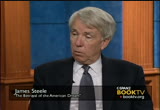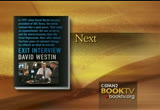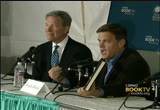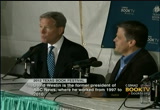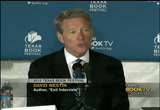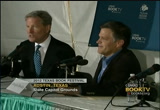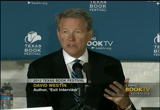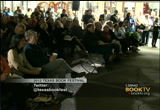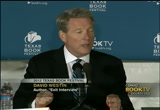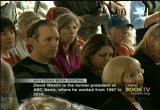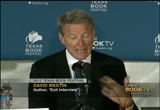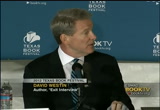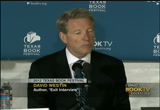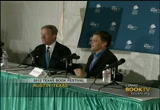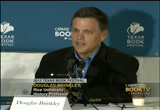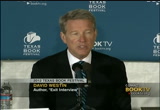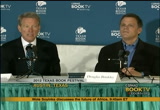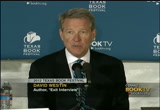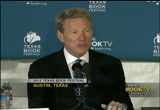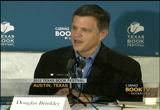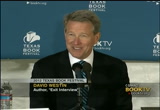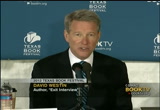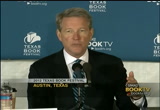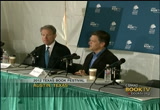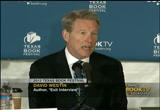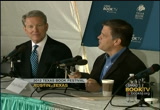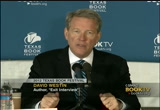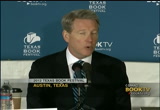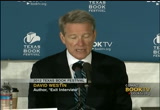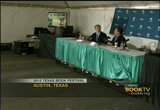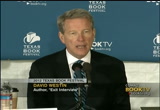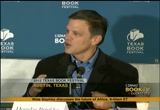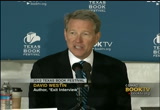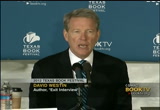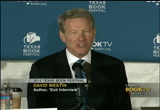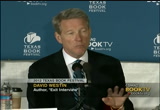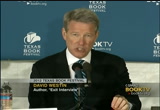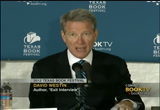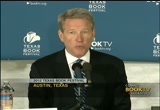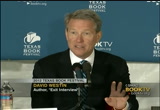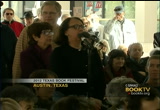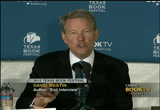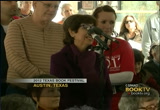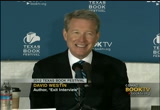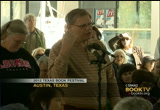tv Book TV CSPAN December 30, 2012 9:00am-9:45am EST
9:00 am
for people who were really strong and upright in that area and just let the chips fall where they may, where the work led you. >> the pulitzer prize-winning investigative team of donald bar let's and james steele will take your calls, e-mails and tweets next month on "in depth." the pair are the co-authors of eight books. their latest, "the betrayal of the american dream." watch sunday, january 6th at noon eastern on booktv on c-span2. ..
9:01 am
>> as someone who lives in austin, it's nice to have this weather. i am welcoming it. i was hard all summer long. i was very excited to get to interview david westin, somebody i've admired from afar. and he has written "exit interview," a book i hope you all get. if you're watching this at your home or you are here in the audience, it's an extraordinary book about his time running abc news in 1997-2010. he was therefore all of the big moments of our recent history, and of all personalities and the broadcasting journalism business, so it's a delight and a real welcome. >> thank you very much. great to be with you. [applause] >> before i get into your book i
9:02 am
just want to ask you about your own trajectory. did you ever plan on -- where we you brought up? did you every think about being in journalism as a teenager or college student? >> i'm a proud michigander, north of here. yeah, exactly, from flint, believe it or not. i was born in flint, michigan. i went to law school and became a lawyer and clerk for justice powell of the supreme court. was a lawyer and was planning to do that for my career in washington. was plucked to be general counsel of the parent company of abc back in 81. i did that for a few years. through a roundabout way i ended up becoming president of abc news. it's not something i ever saw to do. even when what to do it i did it
9:03 am
because we need secession plant because we needed secession plan and his i thought i would do it for a couple of years. the biggest surprise was that came to absolutely love it. i've met some wonderful jobs. i've been very blessed, but been any news organization like abc news, much less running it is a rare privilege. that's part of the reason i wrote the book is, people have not had that experience, some sense what it is like. >> how do you get to go to the supreme court? what was that process? what did you learn at the supreme court that helped you run abc? >> as i said it went to michigan undergraduate, and sort of wandered into the law. i was fortunate because is a great law school. like the one you have here at university of texas, austin. i did pretty well and law school. one of the things you do well, you hope you can clerk. i was chosen by justice powell. the supreme court is an amazing institution, for those of you
9:04 am
who haven't thought much about. it's the only part of government with the senior most people do all the work. think about it. supreme court justices read the briefs and listen to all those arguments. it doesn't work that way with senators or congressmen or presidents. they have people who given summaries of things. it's a great institution. the most important thing for me was just justice powell. he was a truly extraordinary men, someone i worship, became very close with. learning from him and his judgments about people and how to trust people, how to make decisions, how to have the courage of his convictions, the same time to keep as much open, taught me much of what i learned about leadership. >> when i resort about a book on walter cronkite -- >> a wonderful book on walter cronkite by the way. >> i was looking at the history, abc started coming on strong and became the third of the big
9:05 am
three. how did abc news did on a parity with nbc and cbs? what's the timeframe that that happen? >> abc news, everyone always says it's the fourth out of three. for the '60s and '70s but it was a very weak news organization by all accounts. let's be clear. abc was the weakest of networks as well. if you recall there were two can be seen networks. nbc had to spin off one because they have trust concerns. leonard who took it over started building up the entertainment part at abc. is some degree of success for the 70s. he concluded away to really get parity with cbs and nbc was to build a great news organization. not so much because leonard love the news but the local stations been most of their money off of their newscast. he wanted to improve his affiliate line, really created
9:06 am
modern olympics and said you go over the news come you spend as much money as you want which he did. and the buildup started in 1990 -- 1977 through the '80s. he did it in part by bring and what he'd done in sports. he brought in big stars. he already had barbara walters but he brought in david brinkley and diane sawyer and ted koppel he promoted. peter he brought back from overseas. he had amazing graphics on air, amazingly. he was very, very aggressive. he built up into the real powerhouse by the late '80s. >> what was his personality like? if you had to describe him. >> he was a genius. he was larger than life. in his thinking. not in his demeanor. if he was here he was a bit on the shy side actually, and often
9:07 am
totally absent in one of the running jokes is he never return phone calls of everybody, including the head of the company. throughout his life when you call them at home, you'd have crises and you get to people, there was an answering service. there wasn't a voicemail. never return phone calls. after he died, one of his close friends at the wake said to me, do you know he never return phone calls? i said why? because if you're calling him, it was your problem and he didn't care about your problem. [laughter] he wanted you to deal with this problem. but roon have is i think unique ability, besides having a very large vision of what was possible, a unique ability throughout his career when he watched a television program it was as if he never watch television before. one of the problems, they know people on the air, they know what went into. they know they spend a little money, although money.
9:08 am
he acted as if he didn't anybody. if you could view it the way anybody am beauty. they gave him a great sense of what worked and what didn't work on television. >> how did you become the president of abc? >> that's a great question. i have been general counsel and i got to the west coast and overseeing production of entertainment programs, then i was president of -- what was over news. roon on paper with my subordinate. although roon didn't get any bosses basically, it was right. one of the challenges we had was towards the end of roon's career while he was a wonderful news organization that it been built up as i said, it wasn't that she. people within abc news are coming to us and saying, we love roon, we don't want anything bad to happen to roon, but he's got
9:09 am
to move on because things are not getting done. cnn was on the table at that point. they become successful. nbc was on the rise, had taken over number one. they said you have a replacement. so i spent a year and a half or so looking for a suitable replacement for this legend. i tried inside and outside. essentially i pulled a dick cheney. and i said to my boss, i sub-optimizing do we can do but do they want to do. i know these people, i've worked with him as the lawyer and her boss. am not sure what to do. he said i think you can do but i'm not sure you want to. we talked about over two or three months and end up going in. i went going in as a good corporate citizen because i valued abc news. it needed to help. i thought i would give her two years or so. the great shock to me was i really came to love it. sort of a convert in the journalism. it was a remarkable experience and they really inspirational
9:10 am
experience for me. >> tell me about the trials and trouble haitians of president bill clinton. you're coming in and abc in the '90s, and bill clinton is president. yet the impeachment woes. did you have to deal with any of second term clinton problems? >> yeah, a good part of my first year at abc news was dealing with the clinton issues. the monica lewinsky story broke 10 months into my tenure in january of 1998. i was down in cuba. the pope was visiting cuba and we're all -- peter jennings, ted koppel, we have had well over 100 news people down there to cover the event. i got a call one night, cokie roberts and some of the other people from the desk in your thing we've got this investigation we've got going on that looks like it's going to break. there's this young intern who told her close friend that she
9:11 am
had a relationship, inappropriate relationship with the president. i said that's ridiculous. that can't be right. we had no reasonably just telling the truth, that a friend is some truth so forget it. i went back into then and in about an hour they said we just confirmed janet reno, the attorney general, has officially expanded the investigation into the whitewater, remember the whitewater issues involving clinton with financial questions. officially expanded the investigation to include obstruction of justice charges against the president relating to this young woman. at that point we are often running. when that happens you can't ignore. we scurried around to make sure we had the story right, and later that night broke the story. so the white house was very upset with supporters of the president and were very upset with us. we were being buffeted by both sides, both conservatives and liberals. abc news and we and i were put front and center in a because
9:12 am
very early on, two or three days in the story we have the story of the infamous blue dress. we had it exclusively that i personally made sure about the sourcing on, and one of the important lessons i learned in journalism, if you haven't thought about, and exclusive is a great thing as long as it doesn't stay exclusive too long. at the beginning it's great but when it goes on tables or to question whether you got right on the. we at cbs news and geraldo rivera and people going out and saying this is totally bogus. it's totally wrong. we are exclusive about six and a half months before it finally got confirmed. it was a very uncomfortable period. we a lot of -- >> i went to the clinton library only, and i did not see the blue dress. [laughter] it just wasn't there. >> son of a gun. >> time goes on and we forget, but in writing this book i went back and reread some of those, what was happening at the time. today, listen, it was always an awful story because i'm the one
9:13 am
and it seemed potentially important on the other hand it was incredibly tawdry. you are not covering yourself in glory. the thing you have to remember is that the time the blue dress was reported, the basic claim of the white house is it never happened, she's lying. if you recall president clinton met with a series of cabinet officers and said never happen. the reports, i'm not a reports of friends of monica lewinsky said she makes things up, she fantasizes. so the blue dress ended up being, it there have never been able to discover i'm not sure where the story would end up again. >> when bill clinton left office while you were president of abc, i remember al gore running, didn't want to be in a photo op with bill clinton in 2000. to his detriment a thing. probably could've want to get clinton on his side but there was still a stigma to being associated with clinton. now, in this 2012 cycle, he is the rockstar. he is drawing bigger crowds than
9:14 am
anybody and getting praise from all americans. how do you think bill clinton has rehabilitated himself so fully? >> well, i think two things about that. first of all, i personally agree with you about the 2000 election. one of the things i talk about is the 2000 convention, democratic convention, i do if you remember that bill clinton came that bill clinton came down that long white corridor with a black suit, looked like high noon, gary cooper in high noon, remember? at the time of a city with george stephanopoulos watching this. i said george, i think -- out gorgeous game on. georgette the time said no, there's too much discord about president clinton still at this point. but i tended to agree with you. i think two things. number one, i think, this was a shortcoming and i think the media including us at abc news, i think the american people were ahead of us on the monica lewinsky story from the beginning to i think they figured out right quick that, in fact, he did it. they did not approve of it.
9:15 am
they disapproved of it hardly but he was a really good president. thank you, thank you, what's going to do even when he left office his job approval ratings were quite high. the nation was doing quite well. on the other hand the clinton global initiative and some the things he's done since then have been truly excellent eye for an ex-president. he's making a difference around the world, and i think that's now lost on people. >> you mentioned george stephanopoulos. you and abc inherited him from the clinton administration. what made you have confidence in stephanopoulos would be able to make it in the world of ron cason is? >> george is one of the things, and i'll say this in modest and i'm proudest of the abc news, george was a contributor on the roundtable this week when i came in. one of the first things i did was i sat down with him because i've gotten to know him all little bit, and i see how intelligent he is, but also what a wonderful student he is. i mean, unlike many broadcasters
9:16 am
he's willing to go back and relearn things and learn from his mistakes. so i sat down with him and said george, i don't know what you want to do, at the time his teaching, he just written his book about his experience in the clinton administration. and i said i don't know what you want to do but if you want to give all this up and just go into journalism obama i think he would be great. he said it's funny, i've been thinking that's what i'd like to do. i told him, the problem is you have to go back to the beginning. you will have to learn this crap you don't have. whether it's reading a teleprompter or stand up or whatever. he did it. when we moved into the anchor of this week on sunday morning, there was a lot of controversy. the left didn't like them because they thought he be traded president clinton to the right didn't like him because he worked for president clinton. a lot of television affiliates even inside abc was and we just don't think he's an anchor. he just doesn't feel like an anchor. but i believe in him and we worked hard. i think is just super. as i say, i'm very, very proud
9:17 am
of george. he deserves all the good coming his way. he's a very hard worker and a very decent man. >> here, here. agree completely. one of the best in the business of what he does. tell me about george w. bush. tell me about what he's like, and did you ever have any squabbles with the bush administration over coverage of things? >> we have certainly squabbles. i first met them down in austin when he was governor and he was running for president, and one of the traditions in a place like abc news is when you get into president election year you invite all the candidates to come in and meet in an informal meeting with india. that you we had him including al gore who is vice president, but george w. bush's people said you can come to austin. so we flew down, peter and i am sam donaldson and some others flew down to austin. my personal dealings were always
9:18 am
come he was very pleasant. he was very enjoyable to spend time with. very quick. i always thought the media under estimate his intelligence, certainly underestimated his political savvy. i was always very impressed with mr. bush. now that said, particularly as we get into 9/11 and the wars in afghanistan and iraq, the bush white house, the administration was very aggressive, particularly karl rove is not a shy person. carl did not hesitate to let us know if they upset with something we're doing. but it would, i didn't blame him for this. he was doing his job. he was an advocate. he was a very effective advocate and he took issue with a number things we did and we respond as best we could. >> you mention a couple of abc correspondents and an anchor. let me start with sam donaldson. what is sam like? >> san is exactly what you see on the air. just exactly.
9:19 am
he's wonderfully irrepressible. he can't help being sam donaldson. [laughter] he does it at home. he does in time you run into them. he's so energetic. he's so passionate. he loves th the news. hilos washington particularly. loves politics. knows it backwards and forwards. is wonderful but sometimes he gets in his own way. by the way, one of the things i did is i push sand also back in the white house. even the white house correspondent for reagan, and when i went and i was not comfortable the way we were covering the clinton white house and i put him in to the white house. i think about three months before the monica lewinsky scandal broke into a number of reports that i need it was coming. i had no idea. but they thought that's why. a masterstroke but sam donaldson just in time for the monica lewinsky scandal. >> what about peter jennings? iso said, and in the book
9:20 am
jennings seems to be a touchtone person in your life and your career. we all missed peter jennings, his professionalism and he died way too young. but what was your relationship with him? >> percival anyone who knew peter, you would expect new semi-relationship was complicated. he was a complicated man. somebody i do miss, even to this day, and miss sorely when we lost him at abc just because you're such an important intellectual and editorial influence. peter was a great journalist. i suppose that sounds obvious but that meant that he was skeptic in chief. for abc news, both outside and inside. when i came in he was my chief skeptic. he took me out to lunch and said david, you should understand there's a lot of a lot of us are really doubt that you are taking this seriously. we think you're just sort of punching a ticket on the way through to some other job. and you don't really understand.
9:21 am
but he was that way. he was very directive. straight up with a. we started out looking at each other, eyeing each other. i'm really pleased to say we form a very close bond. a sort of on, this is important for people to understand that i do not under appreciated for a link to this. newspeople over time have remarkable bonding because they cover news stories, sometimes in dangerous situations under a lot of pressure with a lot of risk involved, and they form bonds that are very, very deep. and peter, i'm delighted to say, and i formed that kind of on but it was when we did the monica lewinsky, recover the impeachment together and worked closely on that but then we did the millennium program. we are on the air for 24 hours when the millennium dawned as we showed the dawning of the new year around the world in every time zone. then we had 9/11 together. we had the wars together.
9:22 am
those was eventually built up a mutual sense of trust and respect and affection which i treasure today. but peter was a wonderful journalist because he was always looking for the contrarian position. he would never go with cashback sometimes by the way, you can go too far with it. but peter was always saying i'm not sure -- it was true with weapons of mass destruction. when he and i would talk about the buildup of the iraq war, we would do whatever happens, all of the reporting has as we will have weapons of mass destruction. peter always said you can't be that certain the i wish we listen to me more. >> did you ever weigh in on, at abc, that the news wasn't covering a big star in of? i've been annoyed personally this season, three debates, for with the vp, and climate change hasn't gotten talked about. we're having all this freakish weather and all the sciences is so overwhelming about claimant count yet you don't see on the nightly news.
9:23 am
is there a story that you wanted to grab by the scruff of the neck during her tenure at abc and say, we've got to cover this more? >> there were several. we would have discussions about. one of them was the environment and how we covered the environment. and every time we try to do a primetime special environment we wouldn't get a rating. that led, it's one of the chapters i write about, what i do not come across well. we had leonardo dicaprio india president clinton. we got killed for it. we did a primetime environmental special, and he was chairman of earth day that you and i thought he would just make an appearance. i got killed for. that was an attempt to try to cover the environment in a serious way and drive an audience. i was concerned, frankly, about our terrorism coverage. we did more terrorism coverage than others did before 9/11. jon miller went in and
9:24 am
interviewed bin laden, trekked into the mountains in afghanistan and interviewed him. we get a primetime special, but i had some dealings with the military in washington who said their biggest concern wasn't act of terrorism. where discussion on doing more on care. in retrospect i wish we had done more. education is one that does not get covered nearly in the depth that it should be. that are always struggles to try to cover some of those stories. some of which are difficult, are better in print. >> how much pressure is there today to do entertainment as news? you know, lindsay lohan leading into the evening news or the superficiality of news. a lot of people's opinion of journalism has gone down in recent decades. is there a pressure for a president to kind of how much, what's the news versus entertainment quote a? >> sure. the first sort until in the book was a disagreement about the
9:25 am
princess diana coverage why would you a primetime special after she died and peter thought it was a terrible mistake. he quickly came it and decided it was the right thing to do, but that was a constant battle i had within myself and we had within the newsroom or even in the company. that line has moved. it was interesting reading your cronkite book. those issues have been around from the beginning of television, even radio. even walter cronkite did some things that today you would say are on the entertainment side of the alleged. so it's not a new issue but it's an ongoing issue. it's important i think that it remains attention. i think the real danger is when you throw up your hands and say let's just do entertainment. you need someone arguing the other side of that equation all the time. in some ways the broader issue is not so much entertainment as getting an audience. this is an ongoing tension i had with some of the really purists within abc news. i had one anchor, not peter
9:26 am
ginna, and a large group early in my tenure say, i don't care about ratings and you shouldn't either, david. and i said to them, i don't believe that and i don't think you do if you. if you are really a journalist and you believe what your reporting is important and you want as many people there which i do say as possible, and if you don't care if anybody is listening, then you are really keeping a diary. you're not a journalist. so i think that's one of the challenging but also rewarding parts of doing something like television news come is doing really good journalism and getting a big audience. it's easy to be one of those or the other. get a good audience and not care about journalism. do noble things, and you can see in a given broadcast, i can see this today were goes off one way or the other. the real goal is to try to get right at that intersection were you're drawing a big audience measure also covering something important. >> one of my heroes of broadcast journalism you worked with, that's ted koppel and just how influential "nightline" was.
9:27 am
what makes him such a journalist's journalist? >> ted is a remarkable man and a remarkable journalist. maybe this has something about journalism in general and what it takes to be a good journalist, he is very smart. in the end there's a substitute for smart people. diane sawyer is very smart. george is very smart. these are propagated issues and it requires some intellectual firepower, and can do as that. ted has and needs curiosity about the world. and really reporting on a store, talking to different people, understanding very well. ted is also fearless. he is not afraid of anybody or anything. when we are building up to the iraq war in 2000, he and leroy sievers thomas sadly departed, his executive producer and say we want to be a better. i said i'm going to take one of my main anchors and put it in the division going into baghdad?
9:28 am
does that make sense? we talked about for a while and they persuaded me it was something they needed to do so they did this for the better part of three weeks with the troops going in. ted is willing to take on anything. ted is the personification of that. >> tell us about diane sawyer, legendary career, but i really want to hone in on, is the news industry, truly an old boys club, people like sawyer, did they have to break the glass ceiling in order to serve as an anchorperson? >> well, they certainly did. some of that happen before i came in 97. frankly. barbara walters was really the path breaker. you read her memoir, she had to put up with an awful lot. including like a quota on how many questions you asked in the morning so she could last -- so she can let that man ask more. is unbelievable now.
9:29 am
and diane came along, and diane took it to a different level. diane has a wider range that i think it's about certainly any tv journalist has. she really can do it all. she has a sensual desire to do something different and deeper at the same time. so by the time i got there, they pretty much established that women could be anchors and certainly katie couric did something in the morning which hadn't been done before. this was a substitute woman who could do things off the proper terribly well. she transform morning television. but now you have a think a wealth of wonderful women, and i would just mention one, martha raddatz. [applause] spent when we hired her at npr because she was a really great reporter, and really factor and support her because she was so wonderful. she is a fabulous, fabulous nation secured military reported. i was so proud of the job.
9:30 am
i'm biased. i confess that i was so proud of the job she did in the vice presidential debate, partly because she clearly knew the material so well. that's the starting point to i could do the reporting and understand the to it's not just a prompter. it's not just sounding good. it's actually known material which martha does. i thought shield both of those people accountable. she was in the center sort of going at both sides, which is my ideal. i think a wonderful roster of women. we have to thank barbara and diane, people like that. >> i have to last question and then we'll open it up to you, the audience. in october 2008, the stock market just tumbled and we were at the beginning of what some historians are calling the great recession. what was it like doing the news that october in the middle of an election season when the economy started thinking? >> it was interesting because if you had asked us in 2007, and we
9:31 am
talked about this your we thought the presidential election would all be determined by foreign affairs because we are the wars in iraq and afghanistan and it was, by the time it happened it was clear it was only about the economy and it was going south very, very fast. we were struggling to keep up with how bad it was and we were talking to people on the inside. with a series of people from the government, also private economic survey thing is most disturbing was the shock in their eyes. they were scared. these are senior people who would happily scared, which is scared as. one of the things i say and the book is, one of my colleagues said it was like covering a flood while your own basement was flooding. on top of all that our advertising went away. one of the things that corporations do when they're faced with difficulty as they with difficulty is take other discretionary spending to advertising is right at the top of the list. we were facing enormous financial pressure, at the same time went to gear up to cover this really historic and unprecedented deterioration in the economy which by the way we
9:32 am
haven't recovered from to this day. >> barack obama, how big a story come into my, that an african-american became president of the united states? >> let me say personally first, i didn't really -- it didn't really sink in with me until i was in the control room and one of the early primaries and he wanted and i remember just and either thinking he could be president of the united states, and the significance of an african-ameran in my lifetime been president really struck me just personally. i'm not sure that's the right reaction for journalists. it changed so much in this country in the way we perceive one another and perceive race. it's an absolute milestone. that said, i do want to take any -- he's a remarkable man, remarkable intellect.
9:33 am
anyone would've been the republican in 2008, given the economy. [laughter] we had eight years of republican. at heart anyway to 12 years of the same part in office, no matter what unless you want four more years of the same. it was going on with the economy at the point was almost no chance. my personal view is hillary clinton economic, she would've gotten elected. there were lots of forces at work but i think a momentous occasion that we elected an african-american in this country. >> any insight right now? we're just days days before this election. [laughter] all this time you spend in the newsroom, where d.c. this headed in the next few days? >> in a, i guess the good news is i don't know anything more than any of you do. what i would say is what i've been saying, my wife would say this is true for the last six month. i think it's a 50/50 country. it's been a mistake for anybody to protect to quickly it will go one way or the other. it's a 50/50 country. almost apart from other
9:34 am
candidates are. there is an even division. and then i will also, i think it may well come down to ohio. it's a critical state, and i believe this is true. i think there are more auto workers living in ohio than living in michigan at this point. it will be very interesting to see how that plays out. i will say this. i think however it comes out, i think these debates have been wonderful for the country. certainly for television but for the country. a week or two before the first debate it was just all over, why do we pay attention? the level of energy and interest has gone up enormous and i think that's good for all of us, no matter how comes up. comes up. it's a much more interesting, exciting, compelling race which is good for democracy spin. >> we're talking about david westin's "exit interview." if somebody has a question if
9:35 am
you line up at the microphone would be helpful. and yes, sir, we'll start with you. >> understanding your biased toward your own crew at abc which is great, can you speak to your competition as now brian williams and his bunch, scott kelly and his bunch and so forth? and the cables of course. >> i'm happy to. bryant is driven. is number one in eating. he's earned it. he's paid his dues. he's a terrific anchor. very, very stronger a great news authorization at nbc news. their faltering a little bit in the morning a, but they deserve all the success they have had. i have enormous admiration for what cbs news is doing. i don't know, people probably don't know the inside of this, but the longtime executive producer of "60 minutes" has taken over as chairman. he has a man named david rhodes as president of their and they decide to go a different
9:36 am
direction with a network newscast at an evening in in the morning, to be more international and to do more of what we call hard news. i don't like the hard news-soft a distinction but more substantive news. it a true difference. they are number three but they've made some moving. i admire their taking a different tack and they're going for it. cable, i'm, came in during my tenure. when i came in in march of 97, both fox news and msnbc were only three or four months old. the thing that i miss the most of us at the time was the fox news moved to make seniors with polemics, moving away from just 24 hours which has been a very potent combination and this made him a lot of money because they have a fairly defined audience that is deeply engaged. much smaller audience than the broadcast people have but those people are passionate about fox news. that's why. nothing wrong with opinion journalism. i am worried it's starting to skew the way we look at the world to more extreme versions where the most people are likely
9:37 am
more in the center, and between foxes and msnbc you think everybody is way off and i do think it's accurately reflects what we are. i'm not sure that's healthy in the long run. >> one of the criticisms that i think has been prevalent is that as cable has moved to polemics, the broadcast people with perhaps more limited time have just taken on this role of saying there's this view and that is that you. without really confronting the idea that a lot of people in this world on every side live in their own facts. i worry about the arbiters of what could be arbiters simply saying well, they say a and they say become without getting further into 20 minute segment, it's a five minute segment. >> a good question. >> i couldn't agree more. couldn't agree more but i think it's exactly right. either chapter in the book in
9:38 am
the john kerry incident. i think like you do, that part of it is attributable to cable news. you can fall into a pattern as he said/she said. we would've both sides of the argument, you decide what it is. there's some instances in which that's a proper, where there is questions of what we ought to be and isn't a right or wrong with or wrong but there's host of issues, important issues that advances. the reason i use that example was, that was not a matter of opinion but if you'd been there in vietnam and see me, you would know either john kerry was a liar or he was a hero. there was no middle course. too much of the coverage quickly devolved into putting people on both sides expressing their opinion. i chose it because nightly, our friends at "nightline" actions in taking back to vietnam that year in 2004 and found villagers who recounted what happened and pretty much confirmed what the silver star commendation of
9:39 am
incorporate so i concluded john kerry was right. what he said -- there's a whole host of questions like that. it doesn't have to be large controversy. there's some polls. sometimes the news media would put them all up there and say you were supposed to sort them out. medical studies, people and nobody's say some of them are reliable and someone. i think that is something that people in the news media oh you. you. when there is an answer to do the best to figure out to tell you. >> i'm sticking to the medical studies which say caffeine and alcohol are good for your aspe aspect. >> i feel like that there has been a decline in the quantity of hard news in favor of fluff news, that the news media spends more time on what michael jackson had, you know, than what happens with mitt romney. comment?
9:40 am
>> first of all i'm delighted you're an avid abc news watcher. listen, people have asked me about where the news is heading and what's happening. it's changing. going back to your contact book, seeing how much it changed while walter cronkite was there. a change certainly very much and it will continue to change and evolve. i continue to watch abc news, not so much as a user, but you watch and there's always material that i think as you scrape it is also things that are different than would've been when i was there. something i learned abc news is if you want more substantive, whatever you want more of, you hold it within your power to influence the. because no matter who the journalist, no matter how they all react to the audience. they do care. there is great news reporting being done there is outlets, electronically whether it is online or tv or radio, great
9:41 am
news reporting being done right now. if you want more of that, then you need to find it and spending time and energy following it. because the reverse is also true but if you spend all of your time watching the really extreme opinion and washing the rumormongering, you will get more of that, too. one at pet peeves is people say a how outrageous it is news is covering so much of some scandal involving the kardashians or something, and then every recount to me in graphic detail every single thing. [laughter] and it's clear to me they invested a fair amount of time and effort and i want is a just turn it off. you don't have to listen to it. we all share in the shaping of where our news is heading. it lies in our power to head in the right direction. i, too, and the daily watcher of abc. two things. i really like the series that you are doing on made in the u.s.a. i like that a lot. and the other is a question.
9:42 am
this year hbo came out with a show in the newsroom with jane fonda. how's that program been an instructive to the regular networks? >> say the last question again. >> instructive. i want to know your opinion. >> the made in america was my time to thank you very much but i think that was diane sawyer in large part, so the credit should go to her. so i'm delighted that you like that. newsroom, i have watched it, and i find it very entertaining. a lot of fun. i think it's a very successful for hbo. there's a danger and i think there's a group of lawyers watching law shows and doctors watching -- you sort of know too much and it's a little simplified and it's a little black and white. maybe a little preachy at times. but having said that, and let me pick up on the last thing you
9:43 am
said about instructive, i think we can't be reminded too often, those of us in the news media, about why we really came here, what we are really trying to do. the nature of the news is you're going to cover a lot of stories you are not that excited about. there are some stories that are important and deserve. 9/11 which is awful, terrible expense for ever in the country and there was no doubt in our mind once those towers came down why we were doing what we're doing and it was important that we cared about that you can never remind us often enough of a noble part and the public service part of what we do. i think it is useful for that. >> we are down to our last minute and our last question. >> you mentioned those in the newsroom, and a show on it hbo, the newsroom, there's so many people. you see the faces on television but there's a lot of people that go into that report, the producers and writers and people that feed a lot of information to that guy, and they or that
9:44 am
lady, they never get the representation. do they feel the same amount as cokie roberts and salmonella people? >> that's a great question to end on. that's as important as anything i will say. abc news is the one i know, there are literally hundreds of men and women whose names you will never know who will never make that much money, who come in every single day and give everything they have just because they believe in what they are doing. it's not because of the core. it's not because of the thing at all. it deeply dedicated men and women. listen, sometimes we got a raw, sometimes without right. it can be subject to criticism by want people who have not had the opportunity to understand that these people are there working on their behalf and they should be honored for that and respected for that. >> thank you all. by and read david westin's "exit interview," and thank you so much. he's a great
185 Views
IN COLLECTIONS
CSPAN2 Television Archive
Television Archive  Television Archive News Search Service
Television Archive News Search Service 
Uploaded by TV Archive on

 Live Music Archive
Live Music Archive Librivox Free Audio
Librivox Free Audio Metropolitan Museum
Metropolitan Museum Cleveland Museum of Art
Cleveland Museum of Art Internet Arcade
Internet Arcade Console Living Room
Console Living Room Books to Borrow
Books to Borrow Open Library
Open Library TV News
TV News Understanding 9/11
Understanding 9/11